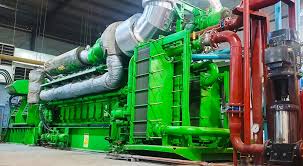The Managing Director of Tiget Business International Limited, Zheng Wei, has revealed that some Nigerian manufacturers are leveraging improved gas supply around Lagos to boost production despite recurring grid collapses. Wei, who oversees one of the country’s largest footwear manufacturers, described this shift as vital to sustaining operations amid Nigeria’s power crisis.
In a statement on Friday, Wei noted that while manufacturers face challenges like inflation, currency instability, and regulatory hurdles, power remains the most critical issue. According to the Manufacturers Association of Nigeria, energy costs make up nearly 40% of manufacturers’ expenses, with limited and unstable grid supply disrupting production and reducing output.
To address this, Tiget partnered with Clarke Energy to install a 6.6 megawatt Jenbacher gas power plant, sourcing gas from a supplier along the Lagos-Ibadan Expressway. The project included assessments, engineering designs, and maintenance services, enabling Tiget to transition to cleaner, more efficient, and cost-effective energy.
“The gas plant is producing cleaner electricity and saving us significant operational costs compared to diesel. It has addressed efficiency issues, making our operations more sustainable,” Wei said.
Yiannis Tsantilas, Managing Director of Clarke Energy for sub-Saharan Africa, emphasized that adopting resilient and cost-effective energy solutions is key to sustainable productivity for manufacturers. He praised Tiget’s leadership for enhancing Nigeria’s economy by improving local market access to quality footwear, reducing unemployment, and increasing investment.
Tiget, incorporated in Nigeria in 2020 and based in Sagamu, imports polyvinyl chloride as a key raw material for its footwear products. The company plans to expand its operations through backward integration and establish offices across Nigeria and Africa. Wei expressed confidence in Nigeria’s potential as a regional economic hub, citing its young, talented population and vibrant local market.
However, he acknowledged the challenges of high fuel costs on logistics and competitiveness. Wei called for investments in refineries to provide feedstock for plastic industries and a stable gas supply to support manufacturers. He argued that these measures would drive industrial growth and enhance Nigeria’s economic stability.
With a population exceeding 220 million, Nigeria’s dynamic market presents significant opportunities. Tiget aims to contribute by producing high-quality footwear that aligns with Nigeria’s rich cultural identity and evolving fashion industry.










